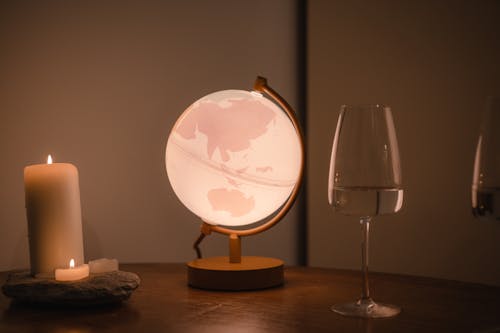Lighting plays an essential role in our daily lives, well beyond its primary function of illuminating our spaces. Indeed, light has a direct impact on our well-being, our mood, and even our health. In this article, we will explore how lighting influences our emotions, our productivity, and our sleep cycle, and how you can adjust the lighting in your home to make the most of it.
1. Lighting and the Circadian Rhythm🌅🌙

The circadian rhythm is our internal biological clock, which regulates our sleep and wake cycles over a 24-hour period. This rhythm is strongly influenced by natural light. When we are exposed to bright light during the day, our body produces less melatonin (the sleep hormone), allowing us to stay awake and alert. Conversely, when the light decreases in the evening, our body starts to produce more melatonin, thus promoting sleep.
However, in a modern world where we spend much of our days indoors, often exposed to artificial lighting, our circadian rhythm can be disrupted. Exposure to lights that are too intense or too cold in the evening, for example, can delay falling asleep and lead to sleep disorders.Tip : Use warm light lamps or adjustable bulbs(like ourCircular Floor Lamp) in the evening to mimic the natural light of sunset and promote the production of melatonin.
2. Lighting and Mood🌤️😊
Light has a profound effect on our mood.Studies have shown that bright light increases the production of serotonin, a hormone that improves mood and helps reduce feelings of stress and depression. Conversely, insufficient or inappropriate lighting can contribute to feelings of fatigue, weariness, and even seasonal depression (seasonal affective disorder), especially during the winter months when natural light is scarce.
It is therefore essential to choose adequate lighting for each room of the house: In the living room or relaxation areas, opt for warm and soft lighting, which creates a soothing and comfortable atmosphere. In the kitchen or office, a brighter and more energizing lighting can improve concentration and productivity. Tip: If you work from home, expose yourself as much as possible to natural light and complement with bright artificial lighting during the day to stimulate your energy and mood. 3. Lighting and Productivity 💡👩💻
Good lighting is crucial for maintaining a high level of concentration and productivity, whether at home or in the office. A poorly lit space can lead to headaches, eye strain, and a decrease in alertness. The key is to find a balance between sufficient lighting to see clearly without creating glare or annoying shadows .
In a workspace, prefer functional lighting such as adjustable desk lamps, which allow you to direct the light where you need it. Dimmable LED bulbs are also an excellent choice, as they allow you to adjust the light according to the task you are performing (reading, working on a computer, etc.). Tip: Make sure your desk benefits from a mix of natural light and artificial lighting. A cold, white light is ideal for precise tasks, as it mimics daylight.
4. Lighting and Relaxation 🛀

Just as bright lighting can stimulate activity and productivity, soft and dim lighting is ideal for moments of relaxation. After a busy day, our body and mind need to relax, and too intense lighting can make this difficult.
- In rooms like the bedroom or the bathroom, lighting should promote a soothing atmosphere.Choose soft light bedside lamps or wall sconces for indirect lighting.
- In a space like the living room, the use of accent lamps, string lights or adjustable fixtures can help create a cozy atmosphere.
Tip : Consider integrating light dimmers to adjust the brightness according to your activity: brighter light for reading, dimmed light for relaxing.
5. Lighting and Creativity🎨✨
Light can also stimulate your creativity. Good lighting is essential in spaces where you want to create, such as art studios or areas dedicated to hobbies.Natural lights or bulbs that mimic daylight are ideal for revealing true colors and creating an inspiring atmosphere. Tip: Use multiple light sources to create shadow and light effects, perfect for stimulating creativity in your artistic or decorative projects.
Conclusion: Optimize Your Lighting for Maximized Well-Being Lighting is not just about illuminating a space; it directly influences our mood, productivity, and overall well-being. By carefully choosing lighting types based on the rooms and activities, you can create environments that support your physiological and emotional needs.Need ideas to improve the lighting in your home? Explore our online store and discover a wide selection of lighting fixtures that combine design, functionality, and well-being!








